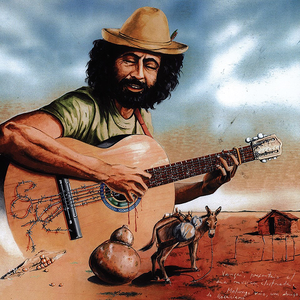Xangai is gifted with a great voice and often teams with Elomar in song-writing and performance as in the
Xangai Canta Cantigas, Incelenças, Puluxias e Tiranas de Elomar album.
Many Xangai records have been released by the Kuarup label (in Brazil).
Ino no Cangaço
Xangai Lyrics
Jump to: Overall Meaning ↴ Line by Line Meaning ↴
Ou decretos do destino
Os cangaceiros temidos do meu sertão nordestino
Quando não tinham apelidos "Volta Seca", "Pente Fino"
Eram sempre conhecidos por nomes findando em "ino"
Se era Lampião, era Virgulino
Que tinha um irmão chamado Livino
Cabra ignorante, Antônio Silvino
E sendo brilhante, era Jesuíno
Tava em toda parte, adulto e menino
Quintino, Galdino, Zé Zeferino, Filismino, Avelino
É cangaceiro presente na voz de Zé Marcolino
Nos versos de Zé Vicente, no barro de Vitalino
Chapéu, mato, guerra
Punhal assassino
Barulho na terra
Silêncio divino
Xangai's song Ino no Cangaço talks about the famous cangaceiros (bandits) from the northeast region of Brazil. The lyrics invite us to listen to similar cases or decrees of destiny, referring to the stories of these feared bandits from the past. These bandits did not have real names, but rather nicknames ending in "ino," which helped to identify them in a certain group or region. They were notorious figures of the landscape of the northeast and have become part of the region's cultural heritage.
The chorus goes on about the nicknames of some of the most famous of these bandits. Lampião, or Virgulino Ferreira, is perhaps the most well-known and revered of all. His brother, Livino, was also a notable figure of his time. Antônio Silvino was another "cabra ignorante" (ignorant man), who despite his lack of education, became a respected leader among cangaceiros. Jesuíno Brilhante, as his name suggests, was a brilliant strategist who was successful in his enterprises. Other names in the song such as Quintino, Galdino, Zé Zeferino, Filismino, and Avelino were also famous bandits, and their stories are part of the northeast’s culture, celebrated in folktales.
Finally, the song ends with a reference to the life of these bandits, where war, hat, and knife fight, fill the air with noise, although the silence after the fight has ended is almost divine. The message is to remember those who lived this violent, rough, unforgiving life vividly.
Line by Line Meaning
Ouçam casos parecidos
Listen to similar cases
Ou decretos do destino
Or the decrees of destiny
Os cangaceiros temidos do meu sertão nordestino
The feared cangaceiros of my northeastern backcountry
Quando não tinham apelidos "Volta Seca", "Pente Fino"
When they didn't have nicknames like "Dryback", "Fine Comb"
Eram sempre conhecidos por nomes findando em "ino"
They were always known by names ending in "ino"
Se era Lampião, era Virgulino
If it was Lampião, it was Virgulino
Que tinha um irmão chamado Livino
Who had a brother named Livino
Cabra ignorante, Antônio Silvino
Ignorant man, Antônio Silvino
E sendo brilhante, era Jesuíno
And being brilliant, he was Jesuíno
Tava em toda parte, adulto e menino
He was everywhere, adult and child
Quintino, Galdino, Zé Zeferino, Filismino, Avelino
Quintino, Galdino, Zé Zeferino, Filismino, Avelino
É cangaceiro presente na voz de Zé Marcolino
It's a present cangaceiro in the voice of Zé Marcolino
Nos versos de Zé Vicente, no barro de Vitalino
In the verse of Zé Vicente, in the clay of Vitalino
Chapéu, mato, guerra
Hat, bush, war
Punhal assassino
Killing knife
Barulho na terra
Noise in the land
Silêncio divino
Divine silence
Contributed by Bella K. Suggest a correction in the comments below.
